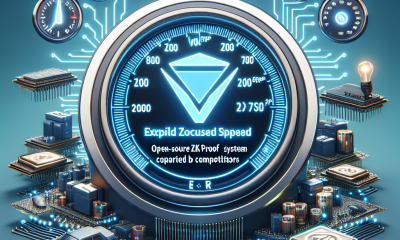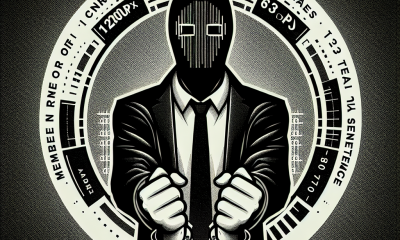Cryptocurrency
Exploring the Future of Finance: Regulated Settlement Network PoC Aims to Unify Banking and Securities on a Single Platform

In an era where financial transactions are increasingly digitalized, a consortium of leading U.S. financial institutions, including banking giants Citi and JPMorgan, is embarking on a cutting-edge research project known as the Regulated Settlement Network (RSN) proof-of-concept (PoC). This initiative aims to investigate the capabilities and advantages of merging commercial-bank money, wholesale central-bank money, and diverse securities—ranging from U.S. Treasuries to investment-grade debt—within a unified, regulated platform.
This pioneering collaboration signifies a significant leap towards the integration of traditional financial mechanisms with the innovative edge of blockchain technology. The RSN project seeks to create a seamless and secure framework where multiple asset classes can coexist and be transacted efficiently. This could potentially revolutionize how financial entities manage and settle transactions, offering unprecedented levels of liquidity, speed, and transparency across the board.
Digital ledger technology, often associated with cryptocurrencies, has been increasingly recognized for its potential to profoundly transform the financial industry. By enabling real-time settlement of transactions, reducing counterparty risk, and cutting operational costs, this technology promises to enhance the overall stability and efficiency of financial markets. The RSN project stands at the forefront of this transformation, aiming to harness these benefits within a regulated and universally accessible network.
The initiative represents a collaborative effort amongst some of the most influential players in the financial sector. By pooling resources and expertise, these institutions are not only poised to drive innovation within their operations but also set a precedent for the industry’s evolution towards a more interconnected and transparent future. The inclusion of both commercial-bank money and wholesale central-bank money suggests not just an enhancement of interbank transactions but a broader overhaul of the existing financial infrastructure, redefining the landscape of monetary exchanges and securities trading.
Moreover, the focus on incorporating U.S. Treasuries and investment-grade debt into the RSN platform underscores the project’s ambition to cater to a vast array of financial instruments. This approach could pave the way for broader acceptance and use of digital ledger technology across different segments of the market, potentially leading to a holistic transformation of financial settlements.
As the RSN project progresses, its outcomes could serve as a critical case study for regulatory bodies and financial institutions worldwide. The insights gained from this proof-of-concept could inform future policies and frameworks, guiding the integration of digital ledger technology in a manner that supports innovation while ensuring robust standards of security and compliance. Therefore, this initiative is not just about exploring new frontiers in fintech but also about shaping the future regulatory landscape in which these technologies will operate.
Critics and proponents alike will be watching closely as the RSN project unfolds. Given its ambitious scope and the caliber of participants, the venture could potentially set new benchmarks for the adoption of blockchain technology in mainstream finance. Success could herald a new era of multi-asset transactions, characterized by heightened efficiency, security, and interoperability within the global financial system. Conversely, the challenges encountered might offer valuable lessons, framing future discussions and developments in the field.
The journey embarked upon by Citi, JPMorgan, and their partners through the RSN research project is a bold venture into uncharted waters. As the digital evolution of the financial sector accelerates, initiatives like these are crucial for leveraging technology to address longstanding inefficiencies and constraints. While it remains to be seen how this ambitious project will unfold, its implications for the future of finance are undeniably profound.
Cryptocurrency
Fantom Foundation Boosts Blockchain Performance with Opera Upgrade to Hit 2000 TPS, Following Google Cloud Partnership

Fantom, a prominent player in the blockchain arena, has recently declared the successful deployment of an important upgrade to its flagship Opera chain. This announcement comes shortly after Fantom fortified its technological infrastructure through a strategic alliance with Google Cloud, which marks a significant step in its pursuit of bolstering its blockchain services. The upgrade, which was meticulously devised, has catapulted Fantom’s Opera chain into a new era of efficiency and scalability.
The recent upgrade has impressively catapulted the chain’s capabilities to process up to 2,000 transactions per second (TPS) under normal conditions, and this figure remarkably rises to 4,000 TPS for token swaps and an astounding 10,000 TPS for token transfers. This enhancement not only signifies a monumental leap in operational efficiency but also establishes new benchmarks in the realm of blockchain technology with transaction finality achieved astonishingly within sub-second to 1.6 seconds, varying with transaction types.
The technical enhancements introduced with the Opera upgrade align closely with the aspirations set during the inception of the Sonic testnet in October 2023. Fantom has commendably adhered to its projected timeline, reflecting the team’s commitment and the project’s unwavering dedication to technological innovation. The achievement of a significant 66% consensus threshold marks a pivotal moment, signifying the collective vote of confidence from stakeholders in the platform’s evolutionary journey.
Despite the profound advancements encapsulated within the Sonic network, Fantom has chosen to retain the emblematic “Opera” moniker for its chain. This decision encapsulates a profound sense of identity continuity while embracing forward-looking technological strides. The Opera chain, now more powerful than ever, boasts the potential to manage approximately 180 million transactions on a daily basis, a feat that represents a quantum leap in blockchain capability.
In tandem with these enhancements, Opera’s upgrade also brings about a dramatic reduction in operational exigencies – a 66% decrease in storage requirements, complemented by a staggering 95% reduction in operational category demands. This transformation is not merely technical but extends to economic dimensions as well, promising a substantial surge in transaction volume. This expectation is grounded in the belief that reduced operational costs will catalyze increased activity on the chain.
The seamless transition to a more adept version of the Opera chain signifies Fantom’s resolve to remain at the forefront of blockchain innovation. The anticipation surrounding this upgrade has energized the Fantom ecosystem, instilling optimism about the potential for more robust and user-centric decentralized applications (DApps). This enthusiasm is further amplified by the potential expansion of Fantom’s horizons through additional upcoming initiatives including enhancements in tokenomics, audience engagement, and strategic partnerships.
The introduction of the Sonic Labs and Sonic Foundation marks a crucial evolution in Fantom’s ecosystem, laying a solid foundation for the development of DApps and ensuring sound governance and treasury management. This evolutionary step is perceived as a testament to Fantom’s commitment towards fostering a thriving and dynamic blockchain ecosystem.
The timing of Opera’s upgrade coincides with a notably optimistic market sentiment towards FTM, Fantom’s native token. Despite recent fluctuations, the token exhibits signs of an impending rebound, with its value currently observed at approximately $0.8132, marking a modest increase of 0.92% over the last 24 hours. Market analysts and enthusiasts closely watching the token anticipate this upgrade to significantly bolster Fantom’s market position, heralding a bright future for its ecosystem.
The endeavors of Fantom to continuously innovate and improve upon its offerings reflect a broader commitment within the blockchain industry to achieve scalability, efficiency, and inclusivity. As Fantom’s Opera chain embarks on this new chapter, the broader implications for the blockchain community and its stakeholders are profound, promising an era of accelerated growth, enhanced security, and unparalleled operational proficiency.
Cryptocurrency
OpenAI Gears Up for Exciting ChatGPT Update: New Features and Potential Pricing Changes on the Horizon

The sphere of artificial intelligence (AI) is currently abuzz with anticipation as OpenAI, led by CEO Sam Altman, prepares to introduce its latest innovations. This move is critical as it places OpenAI at the forefront of AI development, potentially altering the competitive landscape against giants such as Elon Musk’s Tesla and Mark Zuckerberg’s Meta. OpenAI is well-known for its generative text AI, ChatGPT, which has revolutionized how users interact with AI, propelling the organization into a tech vanguard position.
Expert predictions, including insights from AI, cybersecurity, and technology aficionado Alvaro Cintas, hint at several potential updates that could be announced. These updates range from the addition of phone calling capabilities to ChatGPT, which would enable users to have real-time conversations, to the integration of a voice assistant designed to rival the likes of Apple’s Siri and Google’s Assistant. This expansion signifies OpenAI’s ambition to create more immersive and interactive platforms where AI can understand, respond, and even interrupt through real-time interactions, thereby enhancing user engagement.
Furthermore, speculation around the GPT-4 API hints at a substantial pricing overhaul. Amidst discussions is the possibility of a dramatic price reduction, signaling OpenAI’s intention to make its services more accessible. Another rumor suggests the introduction of a free usage tier for ChatGPT with GPT-4 access, although with certain limitations. This strategic move could significantly increase the user base by lowering the entry barrier to OpenAI’s cutting-edge technology.
Despite the enthusiasm surrounding the new updates, expectations for the unveiling of GPT-5 remain subdued, with the immediate focus likely to center on enhancing the capabilities beyond the current GPT-4 model. OpenAI has also teased the potential of a new multimodal AI model that not only engages in conversations but can recognize objects, promising a leap forward in AI application and capabilities.
In preparation for the grand reveal on May 13, enhancements to the ChatGPT iOS app have been noted, including updates to the conversational mode and user interface. These preparations are indicative of OpenAI’s commitment to deliver a refined and user-centric experience. However, amidst this excitement, there is an undercurrent of caution as OpenAI navigates regulatory landscapes to ensure compliance and avoid potential legal challenges.
As the artificial intelligence sector waits with bated breath for OpenAI’s announcements, the implications of these updates extend far beyond mere technical advancements. They signify a pivotal moment in AI development, potentially setting new standards for user interaction and accessibility. OpenAI’s steps towards making its technology more inclusive through pricing adjustments, coupled with the introduction of innovative features, could redefine the boundaries of artificial intelligence. These updates are not just improvements but are indicative of the rapid evolution within the AI domain, marking a significant shift towards creating a future where AI becomes a ubiquitous and accessible tool for everyone.
Cryptocurrency
Yuga Labs Partners with Somnia to Revolutionize Metaverse Interoperability and Enhance Bored Ape Yacht Club NFT Utility

Yuga Labs, the innovative minds behind the culturally iconic Bored Ape Yacht Club NFTs, has entered into a strategic partnership with Somnia, a vanguard in blockchain technology with a focus on metaverse development. This collaboration is poised to redefine the parameters of digital interaction and NFT utility within the expansive virtual landscapes conceived by Yuga Labs, particularly its Otherside metaverse.
Somnia’s pioneering L1 blockchain technology and its omni-chain protocols are architectured to support an astronomical number of transactions, reaching into the hundreds of millions per second. This remarkable capability not only sets a new industry benchmark for metaverse and gaming ecosystem connectivity but also facilitates a seamless, integrated experience across previously siloed digital realms.
At the heart of this partnership is the empowerment of NFT holders, enriching the digital asset ecosystem with increased utility and incentivization mechanisms. Owners of Bored Ape Yacht Club and Mutant Ape Yacht Club NFTs, among others within the Yuga Labs collection, stand to gain significantly. Enhanced functionalities, thanks to the integration of the Somnia Protocol into the Otherside metaverse, will enable avatars to actively engage in a variety of metaverse events, quests, and earning opportunities.
A particularly notable innovation arising from this collaboration is the introduction of the Metaverse Browser. This decentralized portal, akin to renowned gaming platforms like Steam, promises to revolutionize the way users interact with metaverses by streamlining access and participation. Built with an emphasis on inclusivity and ease of use, this browser dispenses with the need for extensive web3 technology knowledge, embodying an open-design ethos that champions content creator freedom and application deployment within the Somnia Ecosystem.
Paul Thomas, Somnia’s founder, emphasized the transformative potential of their partnership with Yuga Labs, “Our collaboration with Yuga Labs is all about enhancing the NFT ecosystem, offering their holders not just utility, but a gateway to immersive, interactive experiences that push the boundaries of what NFTs can do.” This vision underscores a shared commitment to not only augment the utility of NFTs but to also pave the way for unprecedented virtual experiences that leverage the full potential of blockchain technology.
By allowing Yuga Labs NFT holders to use their avatars across a multitude of virtual experiences, this partnership guarantees a level of identity and asset interoperability that was previously unattainable. This means that participants can carry their digital identities and assets seamlessly across different platforms and experiences – from exploring the vastness of Otherside to attending groundbreaking events like the MLB Virtual Ballpark by MSquared. Such consistency enriches the user experience and amplifies the utility of NFT ownership.
Breaking down the implications of this partnership reveals a future where the lines between virtual and physical realities blur, enabled by sophisticated blockchain technology and strategic collaborations. The integration of Somnia’s blockchain and protocol innovations into Yuga Labs’ sprawling metaverse projects signifies a leap forward in digital asset functionality, engagement, and interconnectivity. Moreover, it exemplifies the potential of collaborative efforts to drive the evolution of digital landscapes, making them more accessible, immersive, and rewarding for users around the globe.
In essence, the partnership between Yuga Labs and Somnia embodies a pivotal moment for the NFT community and the broader digital ecosystem. It heralds a new era of interconnected metaverse experiences, underpinned by cutting-edge technology and a shared vision for the future of digital interaction and asset utility. As this collaboration unfolds, it will undoubtedly serve as a beacon for the industry, illuminating the path toward a more integrated, dynamic, and user-centric digital world.
-

 Cryptocurrency2 months ago
Cryptocurrency2 months agoFantom Foundation Boosts Blockchain Performance with Opera Upgrade to Hit 2000 TPS, Following Google Cloud Partnership
-

 Cryptocurrency3 months ago
Cryptocurrency3 months agoProtocol Village Announces ‘Expander’: An Open-Source ZK Proof System Doubling Speed Compared to Competitors
-

 Cryptocurrency3 months ago
Cryptocurrency3 months agoOpenAI Gears Up for Exciting ChatGPT Update: New Features and Potential Pricing Changes on the Horizon
-

 Altcoins2 months ago
Altcoins2 months agoFive Altcoins Including Pepe Coin and FLOKI Eye Major Gains: A Path to Turn $10,000 into $1 Million Revealed
-

 Cryptocurrency3 months ago
Cryptocurrency3 months agoMember of REvil Ransomware Syndicate, Rabotnik, Receives 13-Year Jail Sentence
-

 Cryptocurrency3 months ago
Cryptocurrency3 months agoDropbox Suffers Significant Data Breach: A Detailed Look at the Incident
-

 Altcoins2 months ago
Altcoins2 months agoFetch.ai (FET) Faces Potential Correction as Investor Support Wanes and Death Cross Looms
-

 Cryptocurrency3 months ago
Cryptocurrency3 months agoDr. Ted Kaouk Named Inaugural Chief AI Officer by CFTC




